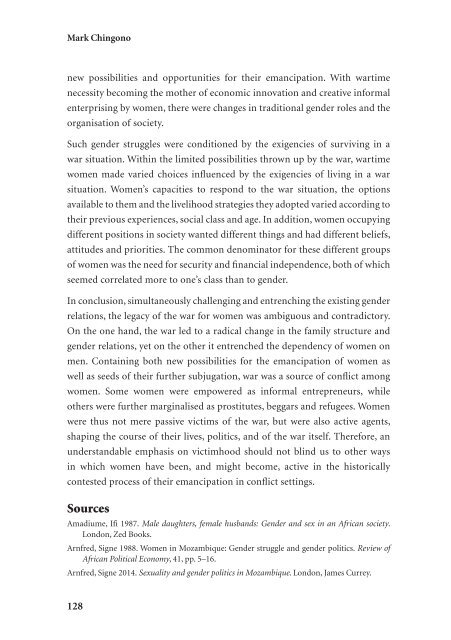ACCORD-ajcr-2015-1
ACCORD-ajcr-2015-1
ACCORD-ajcr-2015-1
- No tags were found...
You also want an ePaper? Increase the reach of your titles
YUMPU automatically turns print PDFs into web optimized ePapers that Google loves.
Mark Chingono<br />
new possibilities and opportunities for their emancipation. With wartime<br />
necessity becoming the mother of economic innovation and creative informal<br />
enterprising by women, there were changes in traditional gender roles and the<br />
organisation of society.<br />
Such gender struggles were conditioned by the exigencies of surviving in a<br />
war situation. Within the limited possibilities thrown up by the war, wartime<br />
women made varied choices influenced by the exigencies of living in a war<br />
situation. Women’s capacities to respond to the war situation, the options<br />
available to them and the livelihood strategies they adopted varied according to<br />
their previous experiences, social class and age. In addition, women occupying<br />
different positions in society wanted different things and had different beliefs,<br />
attitudes and priorities. The common denominator for these different groups<br />
of women was the need for security and financial independence, both of which<br />
seemed correlated more to one’s class than to gender.<br />
In conclusion, simultaneously challenging and entrenching the existing gender<br />
relations, the legacy of the war for women was ambiguous and contradictory.<br />
On the one hand, the war led to a radical change in the family structure and<br />
gender relations, yet on the other it entrenched the dependency of women on<br />
men. Containing both new possibilities for the emancipation of women as<br />
well as seeds of their further subjugation, war was a source of conflict among<br />
women. Some women were empowered as informal entrepreneurs, while<br />
others were further marginalised as prostitutes, beggars and refugees. Women<br />
were thus not mere passive victims of the war, but were also active agents,<br />
shaping the course of their lives, politics, and of the war itself. Therefore, an<br />
understandable emphasis on victimhood should not blind us to other ways<br />
in which women have been, and might become, active in the historically<br />
contested process of their emancipation in conflict settings.<br />
Sources<br />
Amadiume, Ifi 1987. Male daughters, female husbands: Gender and sex in an African society.<br />
London, Zed Books.<br />
Arnfred, Signe 1988. Women in Mozambique: Gender struggle and gender politics. Review of<br />
African Political Economy, 41, pp. 5–16.<br />
Arnfred, Signe 2014. Sexuality and gender politics in Mozambique. London, James Currey.<br />
128


